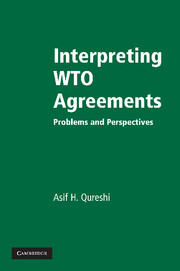Book contents
- Frontmatter
- Contents
- Preface
- List of Abbreviations
- Introduction
- 1 Interpreting principles of treaty interpretation in the WTO
- 2 Interpreting institutional aspects of the WTO Agreements
- 3 The national dimension to interpretation in the framework of the WTO
- 4 Interpreting exceptions in the WTO Agreements
- 5 Interpreting the WTO Agreements for the development objective
- 6 ‘Interpreting’ in external concerns
- 7 Interpreting the agreements on trade remedies
- Conclusion
- Annexes
- Index
5 - Interpreting the WTO Agreements for the development objective
Published online by Cambridge University Press: 23 February 2010
- Frontmatter
- Contents
- Preface
- List of Abbreviations
- Introduction
- 1 Interpreting principles of treaty interpretation in the WTO
- 2 Interpreting institutional aspects of the WTO Agreements
- 3 The national dimension to interpretation in the framework of the WTO
- 4 Interpreting exceptions in the WTO Agreements
- 5 Interpreting the WTO Agreements for the development objective
- 6 ‘Interpreting’ in external concerns
- 7 Interpreting the agreements on trade remedies
- Conclusion
- Annexes
- Index
Summary
Introduction
Of late, there has been considerable general focus among legal analysts on the processes involved in the interpretation of the WTO Agreements. This focus has been direct and also rooted in the continuing appraisal of the WTO dispute settlement system and an exploration of the relationship between the WTO and international law. Yet the methods of interpreting international agreements have been the subject of consideration for almost as long as treaties have been in existence – with established international rules and practices having been in existence for some time now. By the same token, despite the increasing participation of developing members in the WTO and its dispute settlement system, a significant number of developing members have expressed concerns about the manner in which the interpretation and application of the WTO Agreements has advanced the development objective. Thus, it has been asserted:
A careful reading of the accumulated jurisprudence of the [dispute settlement] system thus far reveals that the interests and perceptions of developing countries have not been adequately taken into account. The panels and the Appellate Body have displayed an excessively sanitized concern with legalisms, often to the detriment of the evolution of a development-friendly jurisprudence.
This general focus by jurists on the WTO interpretative process, together with the particular concerns of developing members of the WTO in relation to the development dimension in that process, arises mainly because (as Sinclair stated as long ago as 1973) the apparently established international rules on treaty interpretation
are expressed at a level of generality sufficient to ensure that questions of treaty interpretation will still give rise to serious divisions of opinion as among the members of international tribunals and indeed as among international jurists in general. […]
- Type
- Chapter
- Information
- Interpreting WTO AgreementsProblems and Perspectives, pp. 114 - 159Publisher: Cambridge University PressPrint publication year: 2006
- 1
- Cited by



